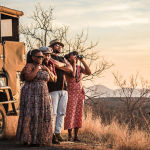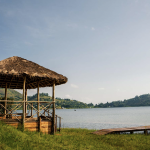Harnessing Africa’s Ancient Past to Shape its Future in High-End Travel
Africa’s ancient landscapes have always held a deep allure, drawing travellers to the cradle of humankind, where the echoes of our earliest ancestors still resonate. But beyond the awe-inspiring nature and rich cultural heritage lies a powerful story that can shape our understanding of Africa’s future. This story is rooted in the continent’s palaeontological treasures, which provide invaluable insights into human evolution, diversity, and resilience. As the high-end African travel industry continues to evolve, these discoveries offer a unique opportunity to reimagine how we present Africa to the world.
We interview Kimberleigh Tommy, a distinguished palaeontologist with the Palaeontological Scientific Trust (PAST), one of Africa’s leading organizations dedicated to the study and preservation of the continent’s ancient fossil heritage. With a deep passion for uncovering the secrets of human evolution, Kimberleigh has been at the forefront of significant discoveries that have reshaped our understanding of early hominins. Beyond her research, she is a committed advocate for education and public engagement, working tirelessly to inspire the next generation of African scientists and to promote pride in Africa’s rich palaeoheritage.
The journey of many leading palaeontologists in Africa, like those at the Palaeontological Scientific Trust (PAST), is not just about uncovering fossils but also about exploring the deep connections between the continent’s ancient past and its present. Inspired by a passion for ancient societies and human evolution, these scientists have dedicated their careers to unravelling the mysteries of our origins. The discovery of species like Homo naledi and the meticulous excavation of the “Little Foot” skeleton are not just scientific milestones; they are narratives that connect us to our shared humanity and the ancient landscapes of Africa.
Kimberleigh Tommy emphasises the importance of these discoveries in understanding our collective heritage: “Africa’s palaeoheritage is not just about the past; it’s about who we are today and how we’ve come to be. By studying these ancient remains, we gain insights into the resilience and adaptability that have shaped human history.”
These discoveries remind us that Africa is not just the birthplace of humankind but also a living repository of our collective heritage. For the high-end travel industry, this offers a profound narrative that can elevate the African experience beyond luxury lodges and exclusive safaris. It allows travellers to connect with the continent on a deeper level, fostering a sense of unity and continuity with our ancestors.
PAST’s mission extends beyond scientific research; it encompasses education, public engagement, and the promotion of Africa’s rich palaeoheritage. Through initiatives like the “All From One” campaign and the “Walking Tall” educational program, PAST is working to instil a sense of pride in Africa’s fossil heritage among its youth and to highlight the continent’s role in the story of human evolution. These programs also serve as powerful tools for combating discrimination and promoting sustainability—values that resonate deeply in today’s world.
Kimberleigh Tommy reflects on this mission: “Our work at PAST is about more than uncovering fossils; it’s about educating and inspiring the next generation. We want young Africans to feel proud of their continent’s role in the human story and to see themselves as part of this incredible journey.”
In the context of high-end travel, these initiatives offer a unique opportunity to differentiate Africa as a destination. By integrating palaeontological discoveries into travel experiences, we can offer visitors a chance to engage with the continent’s deep history in a meaningful way. These experiences can provide a richer, more immersive understanding of Africa’s place in the world.
The field of palaeontology is rapidly evolving, with technological advancements playing a crucial role in uncovering new insights into our past. From 3D imaging to ancient DNA analysis, these innovations are not only enhancing our understanding of early hominins but also making this knowledge more accessible to a global audience. For the high-end travel industry, this presents an opportunity to offer cutting-edge experiences that blend science and exploration. Imagine offering guests the chance to participate in a virtual excavation, guided by leading palaeontologists, or an interactive exhibit that brings the fossils to life through augmented reality.
Kimberleigh Tommy explains the impact of these advancements: “Technology has transformed the way we study the past. With tools like 3D imaging, we can now explore fossils in ways that were unimaginable just a few years ago. This not only advances our research but also allows us to share these discoveries with the world in new and exciting ways.”
However, the conservation of Africa’s fossil sites faces significant challenges, including inadequate funding and a lack of public awareness. PAST is at the forefront of addressing these issues, providing financial support for excavations and advocating for greater public engagement. For the travel industry, supporting these conservation efforts is not only imperative but also a strategic opportunity. By partnering with organisations like PAST, the industry can help ensure that these irreplaceable sites are preserved for future generations, while also offering travellers a chance to contribute to the protection of Africa’s heritage.
Kimberleigh Tommy highlights the importance of this collaboration: “Preserving Africa’s fossil heritage is a collective responsibility. We need to work together—scientists, governments, and the travel industry—to ensure that these sites are protected and appreciated by future generations.”
As the high-end African travel industry looks to the future, there is a unique opportunity to harness the power of Africa’s ancient past to inspire and engage travellers. By integrating palaeontological discoveries into the travel experience, we can offer visitors a deeper connection to the continent and its rich heritage. This approach not only differentiates Africa as a destination but also contributes to a broader understanding of our shared humanity.
In conclusion, the story of Africa’s past is not just a tale of ancient fossils; it is a narrative that can shape our understanding of the future. By embracing this heritage and supporting the work of organisations like PAST, the high-end travel industry can play a vital role in preserving Africa’s heritage and promoting a more inclusive and sustainable future for all.











